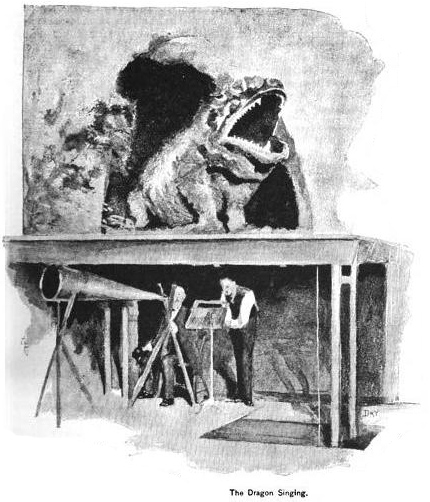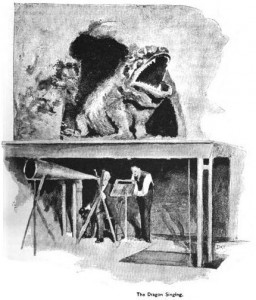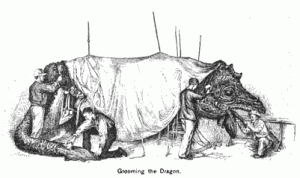The following excerpt was originally published in the March 6, 1898, of The New York Times. It is not only interesting in its description of a theatrical prop store and shop in Midtown Manhattan at the end of the nineteenth century, but remarkable in the fact that the proprietor is a woman. Unfortunately, the article never mentions her name!
A Place to Buy Thunder
That, as Well as Lightning, Fog, Snow, and a Moon, for Sale by a Woman.
Assortment of Oddities
Ingenious Devices Under the Head of Theatrical Hardware—A Japanese and a Donkey Skin Made to Order.
She has thunder by the sheet, fog by the yard, lightning by the box, snow by the bushel, and the child who cries for the moon can get it there, if he will only wait until it is manufactured. It won’t be made out of green cheese, either, but more likely from pale blue silk, for moons have been made out of that before now, and they were eminently satisfactory and couldn’t have been told by any one but a connoisseur from the real article; and who is a connoisseur in moons?
And the mistress of all these natural elements is not a Mme. Jove, either, but a nice, ordinary, every day sort of woman, and this queer collection of hers is merely food for herself and her children. Not literally, for even a pretty, pale blue silk moon might be indigestible, but she provides them for “the profession,” and indirectly they become oatmeal and coffee, roast beef and plum pudding.
It might be thought that the establishment where all these strange things are to be found would resemble those regions supposed to take a low position in the universe, and to be the home of all things unpleasant and flamable, but it doesn’t. It is a modest little place, not so far from Thirtieth Street, on the line of the elevated road and the proper business of the proprietor, when it is called by its right name, is that of dealer in theatrical hardware. The visitor would not even guess, in taking a view of the stock, that the word theatrical was appropriate, for nothing but small articles of seemingly ordinary hardware are in sight.
That is not strange, as there is never a demand for the same kind of thunder, lightning, or other theatrical appliances which are supplied on demand of the property man or the stage carpenter, and very little of anything is kept on hand, though they can be had at a moment’s notice. The hardware proper is the most prosaic part of the business. That consists of the wheels, bolts, screws—everything that is needed to make the curtains and scenery of a theatre stay where they are wanted, and move when they are not wanted. Continue reading A Place to Buy Thunder, 1898



